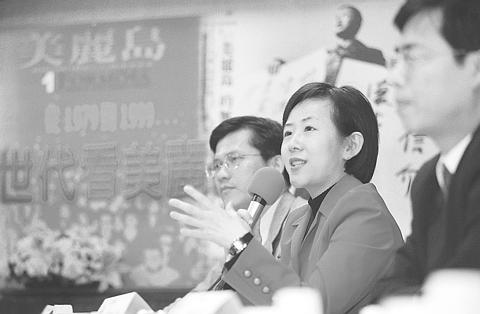A younger generation of Taiwan's political opposition traded impressions over the 1979 Kaohsiung Incident (
"Without the Kaoshiung Incident (
To consolidate Taiwan's democratic system, including the party politics that the DPP has been striving for, is the new task for the next generation, they said.

PHOTO: GEORGE TSORNG, TAIPEI TIMES
Seven DPP scholars and politicians, most of whom were in their teens during the incident, and had later joined the student movements in the 80s, participated in a symposium on the impact of the incident.
For most participants, the incident was their beginning of skepticism regarding politics and propaganda at that time.
"What really shocked me was the public trial itself of the defendants (known as the `Kaohsiung Eight', who were tried for inciting the so-called `riot'). Everyone was so self-confident and righteous in the trial, which really made me think of the situation of our country," said Lai Ching-ling (賴勁麟), a DPP legislator who was a senior high school sophomore at the time.
"At that time I was very much influenced by anti-Taiwan independence propaganda, and so-called `anti-violence' tones in media reports. But in later years, I began to read different `tang-wai' [黨外, or literally `outside the party'] magazines, and I was often moved to tears by the words of Shi Ming-te (施明德) when he was jailed," said Lin Chia-lung (林佳龍), a professor at National Chung-cheng University.
Lai said the incident was the reason he chose to major in politics and became devoted to the DPP. Lin also became a politics major three years after the incident.
For DPP legislative caucus leader Chen Chi-mai (
The incident had also created role models for the future politician that time, according to DPP legislator Wang Shue-feng (
"She was one of only two women, and was also a law school graduate," Wang said.
The participants at yesterday's discussion, all in their 30s, agreed that the incident had opened a space for independent thinking, and had fostered social and political student movements in the 80s that helped the establishment of the DPP itself in 1986.
Wang said the incident ultimately helped Taiwan form a democratic political system, and that what is needed now is to improve the quality of Taiwan's politics.
"Black-gold politics have made the twenty-something generation disappointed with politics. We feel that we should bear a more heavy responsibility, because current politics do not draw a clear-cut distinction between black and white, or between good people and bad people," said Wang.

INVESTIGATION: The case is the latest instance of a DPP figure being implicated in an espionage network accused of allegedly leaking information to Chinese intelligence Democratic Progressive Party (DPP) member Ho Jen-chieh (何仁傑) was detained and held incommunicado yesterday on suspicion of spying for China during his tenure as assistant to then-minister of foreign affairs Joseph Wu (吳釗燮). The Taipei District Prosecutors’ Office said Ho was implicated during its investigation into alleged spying activities by former Presidential Office consultant Wu Shang-yu (吳尚雨). Prosecutors said there is reason to believe Ho breached the National Security Act (國家安全法) by leaking classified Ministry of Foreign Affairs information to Chinese intelligence. Following interrogation, prosecutors petitioned the Taipei District Court to detain Ho, citing concerns over potential collusion or tampering of evidence. The

NEGOTIATIONS: Taiwan has good relations with Washington and the outlook for the negotiations looks promising, Minister of Economic Affairs J.W. Kuo said Taiwan’s GDP growth this year is expected to decrease by 0.43 to 1.61 percentage points due to the effects of US tariffs, National Development Council (NDC) Minister Paul Liu (劉鏡清) said at a meeting of the legislature’s Economics Committee in Taipei yesterday, citing a preliminary estimate by a private research institution. Taiwan’s economy would be significantly affected by the 32 percent “reciprocal” tariffs slapped by the US, which took effect yesterday, Liu said, adding that GDP growth could fall below 3 percent and potentially even dip below 2 percent to 1.53 percent this year. The council has commissioned another institution

NEGOTIATIONS: The US response to the countermeasures and plans Taiwan presented has been positive, including boosting procurement and investment, the president said Taiwan is included in the first group for trade negotiations with the US, President William Lai (賴清德) said yesterday, as he seeks to shield Taiwanese exporters from a 32 percent tariff. In Washington, US Trade Representative Jamieson Greer said in an interview on Fox News on Thursday that he would speak to his Taiwanese and Israeli counterparts yesterday about tariffs after holding a long discussion with the Vietnamese earlier. US President Donald Trump on Wednesday postponed punishing levies on multiple trade partners, including Taiwan, for three months after trillions of US dollars were wiped off global markets. He has maintained a 10 percent

TRADE: The premier pledged safeguards on ‘Made in Taiwan’ labeling, anti-dumping measures and stricter export controls to strengthen its position in trade talks Products labeled “made in Taiwan” must be genuinely made in Taiwan, Premier Cho Jung-tai (卓榮泰) said yesterday, vowing to enforce strict safeguards against “origin laundering” and initiate anti-dumping investigations to prevent China dumping its products in Taiwan. Cho made the remarks in a discussion session with representatives from industries in Kaohsiung. In response to the US government’s recent announcement of “reciprocal” tariffs on its trading partners, President William Lai (賴清德) and Cho last week began a series of consultations with industry leaders nationwide to gather feedback and address concerns. Taiwanese and US officials held a videoconference on Friday evening to discuss the